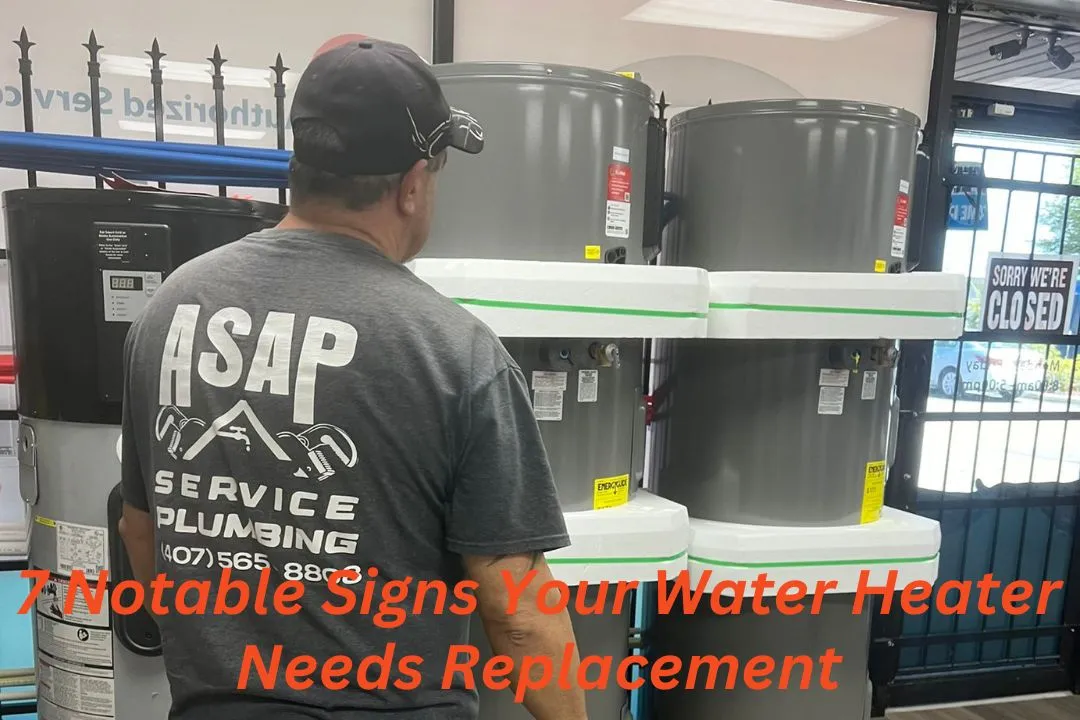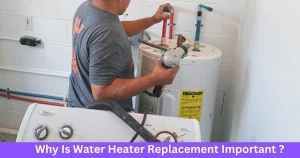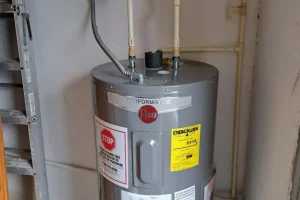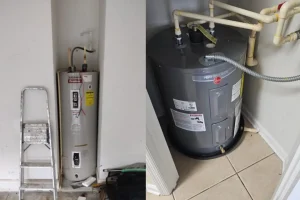We understand how annoying it is to experience cold showers in the morning or find leaks around your home- even more than when it is chilly outside. It’s likely time to think about replacing your water heater.
A new unit can solve these issues, ensuring consistent hot water and safeguarding your property.
In this article, we’ll discuss notable signs that indicate your water heater needs replacing like discolored water, water leakage, strange noises temperature fluctuation, and so on.
By recognizing these signs early on, you can take proactive steps to avoid inconvenient breakdowns and potential water damage.
Also if you are looking for the best water heater replacement service, we’ve got you covered with the best service in Orlando and Kissimmee.
How To Know It Is Time For Water Heater Replacement?
Water heaters are essential for everyday comfort, but like any appliance, they have a lifespan. Knowing when it’s time to replace your water heater can save you from unexpected breakdowns and costly repairs.
Here are seven obvious signs that indicate it may be time for a replacement-
1. Rusty Water Coming From The Sink
If you’re seeing rusty water coming from the sink, it’s a clear sign that your water heater might need replacement. This symptom can lead to difficulties like stains on your clothes or dishes, and even issues with your plumbing system.
The rusty water usually indicates corrosion inside the water heater tank, caused by mineral buildup or a deteriorating anode rod.
You might try flushing the tank or replacing the anode rod as a simple repair, but it’s often best to call an expert water heater repair in Orlando to assess the situation and recommend the best course of action for a lasting solution.
2. Fluctuation In Water Temperature
Experiencing fluctuation in water temperature can be a hassle, signaling potential issues with your water heater. It’s frustrating because you can’t rely on consistent hot water for showers or dishes.
Fluctuations may occur from various factors like-
- A faulty thermostat
- Sediment buildup
- Or a failing heating element.
While you might attempt simple fixes like adjusting the thermostat or flushing the tank, these may not always solve the problem.
In many cases, calling in a professional is the best course of action. They can diagnose the underlying cause accurately and recommend whether a repair or replacement is necessary for your water heater.
3. Water Leakage From The Bottom
In case you spot water leaking from the bottom of your water heater, it’s a clear sign that something’s wrong. This symptom can cause several headaches, like potential water damage to your floors or surrounding areas.
It usually indicates a serious issue inside the tank, like corrosion or a faulty valve. You might think about fixing it yourself, but it usually needs an expert’s touch.
However, you can try a simple fix like tightening the drain valve or checking for loose connections before calling in a professional plumber.
If you are still in the same issue, it’s best to seek an effective service that specializes in water heater replacement in Orlando to prevent further damage.
4. Water Heater Keeps Turning Off
When your water heater keeps shutting off, it’s a clear sign that something’s not right. This can be really frustrating, especially when you need hot water.
It could be caused by a variety of factors, such as:
- A malfunctioning thermostat
- A faulty pilot light
- A defective pilot light
- Electrical issues
- Or sediment buildup in the tank.
Before calling in an expert, you can try a simple fix like adjusting the thermostat settings or relighting the pilot light according to the manufacturer’s instructions.
However, if the problem continues, it’s best to seek professional assistance. Remember, ignoring this issue can lead to inconsistent hot water supply and potentially more severe damage to your water heater.
5. Making Odd Noises
Is your water heater making odd noises? It’s a sign that something isn’t quite right. These noises can range from rumbling and banging to popping or hissing sounds.
They often indicate underlying issues within the heater’s system. One common cause is sediment buildup at the bottom of the tank, which can create pockets of trapped air and lead to these unsettling sounds.
Additionally, thermal expansion or a malfunctioning heating element can also contribute to the noise. To address this problem, you can try flushing out the tank to remove sediment buildup or adjusting the temperature settings to reduce thermal expansion.
6. Insufficient Hot Water Pressure
If you’re experiencing insufficient hot water pressure, it’s likely causing frustration during showers or when using hot water appliances.
This issue can occur from various factors, including mineral buildup in the pipes, a partially closed shut-off valve, or even a malfunctioning pressure-reducing valve.
Before calling a professional, you can try a few DIY fixes like checking for any closed valves or adjusting the temperature settings on your water heater. Additionally, flushing the water heater tank to remove sediment buildup might help improve pressure.
However, if these efforts don’t resolve the issue, you may need to replace your unit. For instance, Orlando water heater replacement services can be a reliable option for you.
7. Higher Energy Bills
A sudden increase in the energy bills is another obvious sign of inefficiency in your water heater.
Several factors can contribute to higher energy consumption, such as sediment buildup in the tank, a malfunctioning thermostat, or old and inefficient equipment.
To address this issue,
- start by checking for any visible signs of damage or leaks in the water heater.
- Next, consider adjusting the temperature settings to a more energy-efficient level
- Or, insulate the hot water pipes to prevent heat loss.
Regular maintenance, such as flushing the tank to remove sediment, can also improve energy efficiency.
Frequently Asked Questions
What makes a water heater last longer?
Are there any benefits to upgrading to a newer water heater model?
What are the consequences of ignoring water heater warning signs?
What is the most common cause of water heater failure?
Conclusion
Lastly, recognizing the signs that your water heater needs replacing is crucial for keeping your home comfortable and safe. From rusty water to fluctuating temperatures and strange noises, these signs should prompt you to think about getting a new one to avoid problems and potential damage.
If you’re in Orlando or Kissimmee and need the best water heater replacement service, you’re in luck. Our expert team is ready to make sure your upgrade goes smoothly, giving you consistent hot water and peace of mind.
Don’t wait until it’s too late—take action now to enjoy reliable hot water and protect your home.




